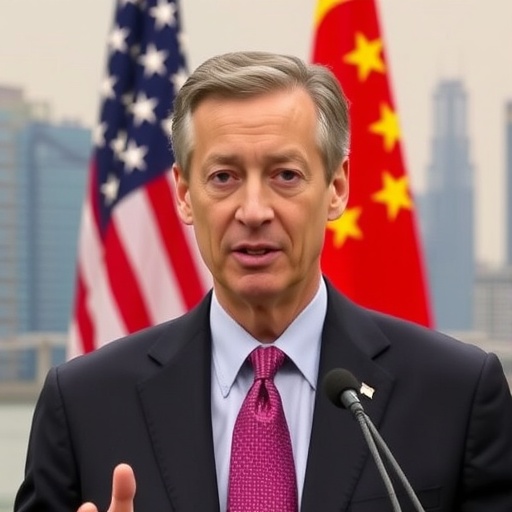Treasury Secretary Scott Bessent Hails Major Breakthrough in U.S.-China Trade Talks, Averting Tariffs and Advancing Fentanyl Fight
In a stunning development that could reshape global economic dynamics, Treasury Secretary Scott Bessent announced significant progress in U.S.-China trade talks on Wednesday, revealing agreements that have successfully averted a fresh wave of threatened tariffs while paving the way for increased agricultural purchases and joint efforts to curb the flow of fentanyl precursor chemicals. This comes just weeks before President Donald Trump’s anticipated summit with Chinese President Xi Jinping, signaling a potential thaw in one of the world’s most contentious bilateral relationships.
The announcement, delivered during a press briefing at the Treasury Department in Washington, D.C., underscores a pragmatic shift in negotiations that have dragged on amid escalating tensions. Bessent, a key architect of the Trump administration’s economic agenda, emphasized that these breakthroughs represent “a win for American workers, farmers, and families battling the opioid crisis.” With U.S.-China trade talks resuming under intense pressure from supply chain disruptions and domestic political demands, this progress offers a glimmer of hope for stabilizing the $600 billion annual trade flow between the two superpowers.
Averting Tariff Escalation: A Timely Diplomatic Victory
The most immediate relief from the U.S.-China trade talks revolves around the successful negotiation to sidestep a proposed 25% tariff hike on Chinese imports, which had been looming since early 2024. Treasury Secretary Scott Bessent detailed how negotiators from both sides hammered out concessions during marathon sessions in Geneva last month, effectively pausing the tariff threats that could have added billions to consumer costs and disrupted industries from electronics to apparel.
According to Bessent, “We were on the brink of a tariff war that no one wanted—least of all the American consumer. By securing these commitments, we’ve bought precious time to build a more sustainable trade framework.” Data from the U.S. Trade Representative’s office indicates that previous tariffs imposed during the first Trump administration cost U.S. households an average of $800 annually, a figure that economists feared would double with the new proposals. The averted tariffs alone are projected to save the U.S. economy up to $50 billion in the coming year, per preliminary estimates from the Peterson Institute for International Economics.
Experts hail this as a diplomatic coup. Dr. Emily Chen, a trade policy analyst at the Brookings Institution, noted in an interview, “Scott Bessent’s team navigated a minefield of mutual distrust. Averting these tariffs isn’t just economic relief; it’s a signal that dialogue can trump confrontation.” The move also addresses criticisms from U.S. manufacturers, who have lobbied fiercely against tariffs that inflate input costs for everything from steel to semiconductors.
Historically, U.S.-China trade talks have been fraught with volatility. The 2018-2020 trade war saw tariffs on $360 billion in goods, leading to retaliatory measures that slashed U.S. agricultural exports by 20%. Bessent’s announcement marks a departure from that era, with both nations agreeing to a six-month review period to monitor compliance and explore further de-escalation.
Securing Agricultural Wins: Revitalizing U.S. Farm Exports to China
A cornerstone of the recent U.S.-China trade talks is a landmark agreement on agricultural purchases, where China has pledged to increase imports of U.S. soybeans, corn, and pork by at least 15% over the next two years. This commitment, touted by Treasury Secretary Scott Bessent as “a lifeline for Midwestern farmers,” directly addresses the export slumps that have plagued American agriculture since the last trade disputes.
In his briefing, Bessent quoted direct assurances from Chinese Vice Premier He Lifeng: “China recognizes the value of stable U.S. agricultural supply chains and commits to honoring these volumes without delay.” The U.S. Department of Agriculture (USDA) reports that China currently accounts for 25% of U.S. agricultural exports, valued at $40 billion annually. The new deal could inject an additional $6 billion into rural economies, particularly in states like Iowa and Illinois, where farm incomes have stagnated at around $70,000 per household amid global uncertainties.
This agricultural pact builds on the Phase One trade deal from 2020, which China failed to fully meet due to the COVID-19 pandemic and shifting priorities. Under the updated terms, enforcement mechanisms include quarterly audits and dispute resolution panels to ensure Beijing follows through. “Farmers have been the unsung heroes in this trade saga,” Bessent remarked. “Today’s progress honors their resilience.”
Stakeholders are optimistic. The American Farm Bureau Federation issued a statement praising the deal, with President Zippy Duvall saying, “This isn’t just about soybeans—it’s about securing food security for both nations and bolstering American heartland jobs.” However, challenges remain: U.S. producers must navigate volatile commodity prices, currently hovering at $12 per bushel for soybeans, influenced by weather patterns in the Midwest and competition from Brazil.
To illustrate the impact, consider the story of Mark Thompson, a soybean farmer from Nebraska. “Last year’s tariffs cost me 30% of my China market,” Thompson shared in a recent USDA survey. “If this holds, I can reinvest in equipment and hire back seasonal workers—real people, real lives.” Such narratives underscore the human element driving these U.S.-China trade talks forward.
Joint Crackdown on Fentanyl Precursors: A Health Security Milestone
Amid the economic focus of the U.S.-China trade talks, a surprising yet critical outcome is enhanced cooperation on fentanyl precursor chemicals, addressing one of the deadliest public health crises in U.S. history. Treasury Secretary Scott Bessent highlighted Beijing’s agreement to tighten export controls on key synthetic opioid ingredients, such as piperidine derivatives, which are predominantly sourced from Chinese manufacturers.
“Fentanyl isn’t just a border issue—it’s a trade issue,” Bessent asserted. “By linking this to our broader negotiations, we’ve turned adversaries into allies in saving lives.” The Centers for Disease Control and Prevention (CDC) reports over 100,000 overdose deaths in the U.S. in 2023, with fentanyl implicated in 70% of cases. Precursors from China fuel 90% of the illicit supply chain, according to the Drug Enforcement Administration (DEA).
Under the new pact, China will implement real-time tracking of chemical shipments to the U.S. and share intelligence with the DEA, marking the first formal bilateral mechanism of its kind. This includes joint task forces and penalties for non-compliant firms, potentially reducing precursor flows by 40% within a year, per DEA projections. Bessent credited “quiet diplomacy” for this win, noting that initial talks stalled until trade incentives were bundled in.
Public health advocates are cautiously celebratory. Dr. Nora Volkow, director of the National Institute on Drug Abuse, commented, “This cooperation could be transformative. Fentanyl’s devastation touches every community—from urban centers to rural towns.” Yet, skeptics point to past enforcement lapses; a 2022 UN report criticized China’s lax oversight, allowing precursors to be rerouted through Mexico.
The agreement also ties into broader sanctions frameworks, where the Treasury’s Office of Foreign Assets Control (OFAC) will monitor compliance. For families affected by the crisis, like those represented by the advocacy group Families Against Fentanyl, this feels like progress. “We’ve lost too many to this poison,” said co-founder Anne Kenney. “If Scott Bessent’s efforts stem the tide, it’s a legacy worth fighting for.”
Paving the Way for the Trump-Xi Summit: High-Stakes Diplomacy Ahead
As U.S.-China trade talks yield these tangible gains, all eyes turn to the upcoming summit between President Trump and President Xi, tentatively scheduled for mid-November in Singapore. Treasury Secretary Scott Bessent framed the recent progress as “the foundation for a productive dialogue,” suggesting that tariffs, agriculture, and fentanyl will dominate the agenda.
Trump, who has long championed aggressive trade policies, tweeted post-announcement: “Big wins with China today—tariffs on hold, farms booming, drugs stopped. Summit will seal the deal!” Xi’s administration, facing domestic economic slowdowns with GDP growth at 4.7% in Q3 2024, sees value in de-escalation to attract foreign investment.
Geopolitical analysts anticipate ripple effects. The summit could extend the tariff truce indefinitely and expand into tech transfers and intellectual property protections, areas where U.S. firms lose $50 billion yearly to theft, per the IP Commission. However, risks loom: Human rights concerns, Taiwan tensions, and South China Sea disputes could derail momentum.
Economically, success here might boost U.S. stock markets, with the Dow Jones already up 2% on the news. Forward-looking, Bessent outlined a roadmap: “We’ll monitor these deals rigorously and push for deeper integration. The goal is fair trade that benefits both sides.” International partners, from the EU to ASEAN nations, watch closely, as U.S.-China stability underpins global supply chains worth trillions.
In the long term, this progress could redefine U.S.-China relations, shifting from rivalry to managed competition. As Bessent concluded, “These aren’t just agreements—they’re steps toward a more secure, prosperous world.” With implementation challenges ahead, the true test lies in execution, but for now, the breakthroughs offer a beacon of optimism in turbulent times.








